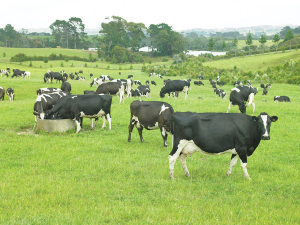Wired for Science: Understanding the feeding habits of mealybug
Fussy children might be frustrating, but fussy mealybugs could help protect the New Zealand wine industry from grapevine leafroll-associated virus 3.
 The research also showed that the low MUNBV cows also yielded an increase in milk protein percentage.
The research also showed that the low MUNBV cows also yielded an increase in milk protein percentage.
New research from Lincoln University has revealed that the genetic disposition of dairy cows could significantly reduce nitrate leaching.
Lincoln University’s Pastoral Livestock Production Lab found that grazing dairy cows with low milk urea nitrogen breeding values (MUNBV) have a 28% reduction in the urinary urea nitrogen loading rate per urine patch than cows with higher MUNBVs.
The lowest MUNBV animals in the study excreted 165.3 g less urinary urea nitrogen per day than the highest MUNBV animals.
As an example, at four cows per hectare, this difference equates to 241kg urinary urea less deposited onto pasture, resulting in 41kg less nitrate leached per hectare per year.
The research, completed by PhD student Cameron Marshall, also showed that the low MUNBV cows also yielded an increase in milk protein percentage.
Lincoln’s Professor of Livestock Production Pablo Gregorini says the findings are very significant for farmers and the entire agriculture sector.
“Cameron’s work shows that the cows themselves are an important tool in helping to cut nitrate leaching and nitrous oxide emissions, and in helping farmers meet their regulatory reductions. To be able to do this and increase milk protein at the same time is a huge win:win for the sector.
“Most farmers’ herds will naturally comprise a mixture of low MUNBV cows and higher MUNBV cows, with the trait being identified through testing the milk. Simply identifying the animals with low MUNBVs will enable famers to breed from their existing stock and change the makeup of their herd over time.”
Research into the differences between low MUNBV and higher MUNBV animals will continue, with Cameron Marshall studying the data to identify where further benefit-yielding research should be directed.
A New Zealand dairy industry leader believes the free trade deal announced with India delivers wins for the sector.
The Coalition Government will need the support of at least one opposition party to ratify the free trade deal with India.
Primary sector leaders have welcomed the announcement of a Free Trade Agreement between India and New Zealand.
At Pāmu’s Kepler Farm in Manapouri, mating has wrapped up at the across-breed Beef Progeny Test.
More than 150 people turned up at Parliament recently to celebrate the 20th anniversary of Horticulture New Zealand (HortNZ).
Biosecurity New Zealand says Kiwis should continue to keep an eye out for yellow-legged hornets (Vespa velutina) over the holiday season.